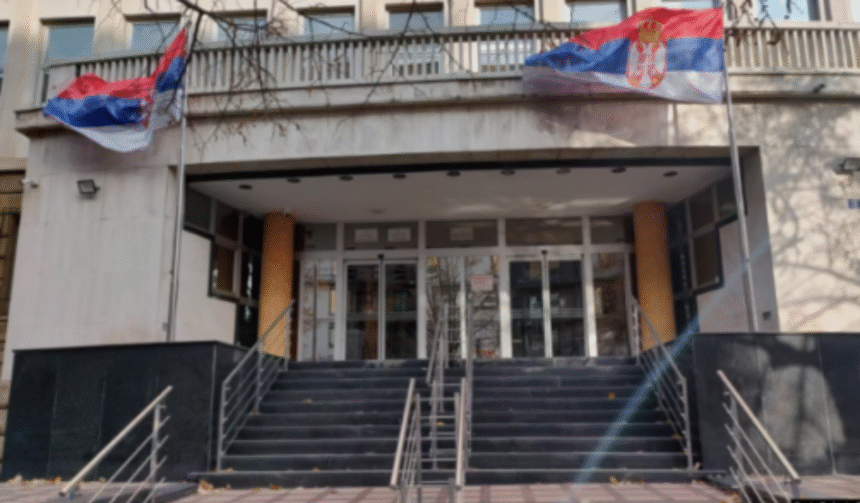Unlike previous years, Serbia’s War Crimes Prosecutor significantly increased the number of indictments filed in 2024.
Most of these indictments target ethnic Albanians from Kosovo and, according to the Humanitarian Law Center (HLC), are the result of political pressure from Serbian authorities and pro-government media.
Although Serbia continued to arrest Kosovo citizens at border checkpoints in 2024, most indictments are against individuals who are beyond the reach of the Serbian judiciary.
According to the HLC, instead of improving cooperation with Kosovo, Serbia is increasingly resorting to trials in absentia.
The year 2024 was also marked by a lack of cooperation with neighboring countries, delays in prosecuting 1990s war crimes, disproportionate sentencing for convicted individuals, and a failure to prosecute senior members of Serbian forces.
Throughout the year, Serbia publicly glorified convicted war criminals and launched a state-led campaign to deny the genocide in Srebrenica.
“The conditions in which war crimes trials are conducted in Serbia remain very unfavorable. In 2024, the atmosphere of a revisionist memory policy persisted,” said Jovana Kollariq from the HLC during the presentation of the organization’s latest report.
The War Crimes Prosecutor’s Office did not respond to questions from Radio Free Europe regarding the findings of this NGO, which monitors all war crimes trials in Serbia.
How many indictments were issued?
In 2024, the War Crimes Prosecutor in Serbia filed eight indictments against ten individuals.
One of the cases was transferred from the Prosecutor’s Office in Bosnia and Herzegovina, while the other seven targeted Kosovo Albanians for crimes allegedly committed against Serb civilians in the late 1990s.
Six of the accused are not in Serbia’s custody and will be tried in absentia.
“Without institutional exchange of evidence and information between Serbia and Kosovo, weak indictments will continue to be issued, which will be difficult to prove,” said Mirjana Pešić from the HLC.
She added that a similar situation is occurring in Kosovo, where the Special Prosecution in 2024 filed six indictments against 11 Serbian force members, all to be tried in absentia.
Although Serbia and Kosovo signed a mutual legal assistance agreement in 2013, brokered by the European Union, the Kosovo Institute of Justice reports that Serbia has failed to cooperate in any war crimes cases.
What verdicts were issued?
In February 2024, the High Court in Belgrade sentenced Tefik Mustafa to one year in prison for “organizing and inciting the commission of genocide and war crimes.”
Mustafa had been arrested in June 2024 at the Merdar border crossing and was accused of participating, along with around ten members of the Kosovo Liberation Army (KLA), in the kidnapping of three civilians near the village of Llabjan in June 1999.
“According to the verdict, the court accepted the prosecution’s claim that the KLA group was organized to commit criminal acts, despite insufficient evidence. During the ruling’s announcement, the court failed to publicly explain why it rejected the defendant’s defense,” stated the HLC.
The trial concluded in just two days, which the HLC criticized as a rushed process that did not contribute to uncovering the truth or delivering justice — but rather deepened victims’ mistrust in institutions.
This case was just one in a series of arrests of Kosovo Albanians in Serbia.
Hasan Dakaj, arrested in January 2024, was released after a year following a plea agreement with the prosecution over an indictment for crimes against civilians.
Another Kosovo citizen, Nezir Mehmetaj, was sentenced in December 2024 to six years in prison for the same offense. Arrested five years earlier, he spent the entire time in pretrial detention.
“The fact that most charges were not proven, and the defendant was convicted on only one count, raises the suspicion that the indictment was politically motivated and not based on solid evidence,” the HLC noted.
In addition to Mehmetaj’s case, the High Court in Belgrade issued three first-instance verdicts in 2024 for war crimes in Bosnia and Herzegovina, and two rulings in retrials.
In April 2024, seven former members of the Yugoslav People’s Army (JNA) were sentenced to a total of 56 years in prison for the 1999 massacre of Kosovo Albanians in the villages of Qyshk, Zahaq, Pavlan, and Lubeniq.
“Although the amended indictment listed numerous crimes, the verdict significantly reduced the scope of criminal responsibility and drastically limited the number of recognized victims,” stated the HLC.
According to the report, the defendants were convicted only for the killing of 57 civilians in Qyshk, while no one was found guilty for the documented killings of 42 in Lubeniq and 17 in Zahaq — crimes also recognized by the Hague Tribunal.
The HLC found most sentences disproportionate and, in some cases, below the minimum legal threshold.
“Many of the submitted pieces of evidence showed that responsibility extended beyond direct perpetrators and implicated the entire Yugoslav Army command chain, which was completely excluded from the indictment,” the report stressed.
This trial lasted 14 years. The first verdict was issued in 2014 but was annulled by Serbia’s Court of Appeals in 2015.
Endless trials
A clear example of prolonged proceedings is the case of the 1993 abduction and murder of train passengers in the village of Shtërpcë in Bosnia and Herzegovina. The indictment against members of the “Avengers” unit was confirmed only in 2018.
The trial began in January 2019, but in November 2023, the Court of Appeals overturned the first-instance verdict, and the case was returned for retrial.
“This is a drastic example of inaction and inefficiency in the judiciary, revealing how justice institutions themselves contribute to delays and the denial of justice for victims,” noted the HLC, adding that two of the accused have since died.
Meanwhile, the trial for the killing of 1,313 Bosniak civilians in Kravica near Srebrenica, which began in late 2016, remains in the evidence stage more than eight years later.
Serbia’s prosecution indicted eight members of the Republika Srpska Special Police Brigade for crimes against civilians, despite Bosnian and Hague courts having already issued genocide or crimes against humanity convictions for the same events.
“The prosecution dishonestly avoids the term genocide, as such charges are politically unacceptable in Serbia, where top state officials refuse to acknowledge the genocide in Srebrenica,” the HLC explained.
All defendants in this case remain free, and due to their absence, 15 court sessions in 2024 were canceled.
“Claims of poor health have become a tool to deliberately stall proceedings and aim for procedural incapacity of the accused,” said the HLC.
Since 2010, the HLC has filed criminal complaints against senior officers of the Republika Srpska Army for suspected participation in the Srebrenica genocide. Yet, by the end of 2024, Serbia’s prosecution had not initiated any investigation.
Likewise, Serbia has failed to implement a 2014 Bosnian court verdict sentencing Novak Gjukić to 20 years for the killing of over 70 people in Tuzla. Gjukić fled to Belgrade before sentencing and continues to live there freely.
Is there regional cooperation?
Despite the existence of a Protocol on Cooperation in War Crimes Prosecution, Serbia’s War Crimes Prosecutor refuses to hand over cases to Bosnia’s judiciary.
One such case involves Miomir Jasikovac, former commander of the Zvornik Brigade’s military police unit. Serbia indicted him for war crimes just days after Bosnia charged him with genocide in Srebrenica.
Serbia’s indictment drastically reduced the number of victims, and the prosecution struck a plea deal with Jasikovac, resulting in a minimal five-year sentence.
To date, only one case has been transferred to Bosnia — that of Edin Vranjić, a Bosnian citizen arrested in September 2021 at the Serbia-Bosnia border on suspicion of war crimes. He was released from detention after one month.
“Even in that case, the handover happened only after political intervention by Serbia’s president,” the HLC report noted.
More than a year has passed since The Hague Tribunal transferred to Serbia the case against Serbian Radical Party leader Vojislav Šešelj for contempt of court, but proceedings in Belgrade have yet to begin.
Šešelj, like many convicted war criminals, appears regularly on pro-government national TV channels as a political commentator.
“Following the UN Resolution recognizing July 11 as the International Day of Remembrance of the Srebrenica Genocide, Serbian authorities, state media, and tabloids led a fierce campaign against the designation,” recalled Jovana Kollariq of the HLC.
She added that civil society representatives who urged institutions to support the resolution and acknowledge the genocide were branded “traitors” by politicians and pro-government media.
Even the European Commission, in its most recent progress report on Serbia, warned that:
“A number of politicians and media outlets continue to publicly deny war crimes and genocide and provide support and media space to convicted war criminals — without consequence.”
The Commission concluded that Serbia still has not demonstrated genuine commitment to investigating and prosecuting war crimes.







